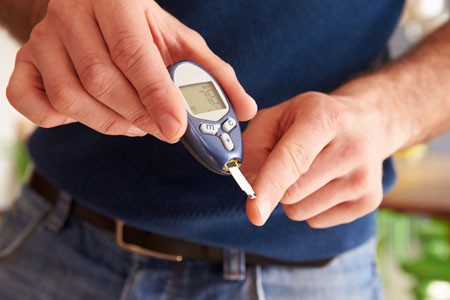Bad Habits May Reduce Brain Volumes, May Cause Dementia
Smoking, alcohol use, obesity, and diabetes aren’t just harmful to the body. They may actually lead to dementia.
Behavioral risk factors for cardiovascular disease like those listed above have been linked to reduced volume in the brain as a whole and several brain regions, including the hippocampus, precuneous, and posterior cingulate cortex. A 2015 study by researcher Kevin King and colleagues found that these reduced brain volumes are early indicators of cognitive decline.
King and colleagues analyzed data on 1,629 participants in the long-term Dallas Heart Study. Their cardiovascular risk factors were assessed when they began the study, and their brain volume and cognitive function were measured seven years later.
Alcohol use and diabetes were associated with lower total brain volumes, while smoking and obesity were linked to low volumes in the posterior cingulate cortex.
Low hippocampal volume was linked to past alcohol use and smoking, while lower precuneous volume was linked to alcohol use, obesity, and blood glucose levels.King and colleagues suggested that subtle differences in brain volumes in midlife are the first sign of developing dementia in participants who were still younger than 50 years of age.
Liraglutide FDA-Approved for Obesity
 The drug liraglutide (trade name Saxenda) has been approved by the Food and Drug Administration (FDA) as a treatment for obesity. It had previously been approved for the treatment of type 2 diabetes.
The drug liraglutide (trade name Saxenda) has been approved by the Food and Drug Administration (FDA) as a treatment for obesity. It had previously been approved for the treatment of type 2 diabetes.
Liraglutide is taken as a daily injection and is meant to be used alongside a calorie-reduced diet and increased physical activity. Liraglutide works by mimicking a peptide (GLP-1) that regulates appetite and calorie intake.
Recommended dosage is 3 mg/day, but should begin at 0.6 mg/day for the first week and gradually increase by 0.6mg each week to reduce the likelihood of gastrointestinal side effects.
In three clinical trials, participants who were overweight or obese, some of whom had weight-related conditions such as high blood pressure, type 2 diabetes, or high cholesterol, either received training about following a reduced-calorie diet and increasing physical activity or had already lost up to 5% of their body weight by engaging in these practices.
Among those participants who did not have diabetes or a weight-related condition, 62% lost up to 5% of their body weight after a year of taking liraglutide, compared to 34% of those who were given a placebo injection.
Of the participants who had type 2 diabetes, 49% lost up to 5% of their body weight after a year of liraglutide, compared to 16% of those who received placebo.
Of those who had a weight-related condition other than diabetes, 42% lost up to 5% of their body weight compared to 21.7% who took placebo.
Diabetes Drug Pioglitazone May Improve Depression
 Researchers believe there is a link between diabetes and depression. Some drugs used to treat type II diabetes and its associated inflammatory symptoms have been found to improve depression as well. These include metformin, rosiglitazone, and pioglitazone. A recent study by Natalie Rasgon and colleagues explored the effects of pioglitazone treatment on people with insulin resistance, insulin sensitivity and/or pre-diabetes and ongoing depression. The researchers hoped to find that adding pioglitazone to the patients’ regular antidepressant regimen might improve depression by reducing inflammation.
Researchers believe there is a link between diabetes and depression. Some drugs used to treat type II diabetes and its associated inflammatory symptoms have been found to improve depression as well. These include metformin, rosiglitazone, and pioglitazone. A recent study by Natalie Rasgon and colleagues explored the effects of pioglitazone treatment on people with insulin resistance, insulin sensitivity and/or pre-diabetes and ongoing depression. The researchers hoped to find that adding pioglitazone to the patients’ regular antidepressant regimen might improve depression by reducing inflammation.
The study also touched on the role of telomere length in mental and metabolic disorders. Telomeres are repeated DNA sequences that sit at the end of chromosomes and protect them during cell replication. Telomeres get shorter with aging and with psychiatric illnesses. In the study, telomere length was used to predict whether patients’ depression would improve.
Rasgon and colleagues found that in those patients taking both pioglitazone and antidepressant treatments (compared to those who received a placebo in addition to their antidepressants), longer telomeres predicted better antidepressant response. This suggests that telomere length could be used as a biomarker—that is, measuring a patient’s telomere length could reveal whether that patient’s depression is likely to respond to an anti-inflammatory treatment such as pioglitazone. The research was presented at a 2015 scientific meeting.
Clarifying the Effects of a Diabetes Drug that Improves Bipolar Depression
Research continues on pioglitazone, a drug typically used to treat diabetes but with other positive effects on depression and stroke risk. Some researchers are working on determining whether the drug increases the risk of developing certain cancers, including bladder, prostate, and pancreatic cancers. A recent study by James D. Lewis and colleagues in the journal JAMA found no statistically significant increase in risk of bladder cancer among patients taking the drug, but the researchers said they also couldn’t rule out that the drug may increase this risk, as has been seen in previous studies. The study by Lewis did show an increase in pancreatic and prostate cancers in patients taking pioglitazone, but the researchers did not determine whether this was caused by the drug.
Another recent study by Walter N. Kernan and colleagues in the New England Journal of Medicine reported that pioglitazone reduced the incidence of stroke and heart attack in patients with a history of stroke or blocked blood vessels in the brain but without a diagnosis of diabetes. Patients who received pioglitazone also experienced side effects including weight gain, edema (an increase in fluids in the body’s tissues) and serious bone fractures.
Pioglitazone has had positive effects in bipolar depression and may one day be used as a treatment for bipolar disorder. For now, it may be worthy of consideration for the treatment of diabetes in patients who also have bipolar depression.
Diabetes Complicates Bipolar Disorder
People with bipolar disorder are three times more likely than the general population to develop type 2 diabetes. Type 2 diabetes typically occurs in adulthood and is associated with insulin resistance, as opposed to type 1, which is usually diagnosed in childhood and is associated with insulin deficiency.
In a talk at the 2015 meeting of the Society of Biological Psychiatry, researcher Tomas Hajek reported that in a large group of bipolar patients, 13% reported a history of type 2 diabetes, 21% were diagnosed with type 2 diabetes upon laboratory evaluation, and 32.2% had pre-diabetes without realizing it. Thus, about half of these patients with bipolar disorder were either affected by diabetes or at risk for it, many without knowing it.
The Bad News
Diabetes complicates the course of bipolar illness. Type 2 diabetes is associated with poorer response to treatment, atrophy of the hippocampus, cognitive impairment, and higher rates of conversion from mild cognitive impairment to full-blown dementia.
The main effect of type 2 diabetes is insulin resistance. The body produces enough insulin, but insulin’s effects at its receptors are impaired. Diabetes also causes deficits in growth factors, increases in the enzyme GSK3B, decreases in mitochondria and brain-derived neurotrophic factor (BDNF, which protects neurons), and glucose toxicity.
Recent research by Hajek and colleagues shows that diabetes has several other detrimental effects on the brain in bipolar disorder. On magnetic resonance spectroscopy (MRS) scans, people with type 2 diabetes had lower levels of NAA, a marker of neuronal integrity, in the prefrontal cortex. This can indicate impaired functioning. People with type 2 diabetes also had lower levels of creatine, indicating impaired energy metabolism. In addition, hippocampal volume decreases with aging, and type 2 diabetes accelerated this age-related decline.
Some of diabetes’ effects on the brain are mediated by other health factors, including obesity, cerebral blood vessel disease (which affects white matter integrity), and side effects from medications.
What You Can Do
Start early with a good diet and exercise, and have regular checkups with a doctor, who can tell you if you have diabetes or are at risk for it. If so, start long-term preventative treatment with the most effective and easy-to-tolerate medications, and periodically have your fasting blood sugar tested. If these tests are abnormal, have your hemoglobin A1c (HbA1c) checked. This is a measure of good glucose control, and should be under 6. If it creeps upward toward 6 (a sign of pre-diabetes), the drug metformin may be able to prevent the onset of type 2 diabetes. If you have type 2 diabetes, there are several types of effective medications that can minimize its effects.
New Injectable Treatment for Obesity
Liraglutide, an injectable drug used to treat Type 2 diabetes, has been approved by the Federal Drug Administration for the treatment of obesity. The drug is newly formulated in recommended doses of 3mg/day under the brand name Saxenda. Liraglutide is suggested for adults with a body mass of 30 or above, or 27 and above with other weight-related conditions such as hypertension, diabetes, or high cholesterol.
In clinical trials, out of 3,731 participants without weight-related comorbid conditions, 62% of those who received liraglutide lost at least 5% of their body weight, compared to 34% of those who received placebo. Of the 635 participants with Type 2 diabetes, 49% of those who received liraglutide lost at least 5% of their body weight, compared to 16% of those who received placebo. In the 422 participants with other weight-related comorbidities, 42% of those taking liraglutide lost 5% or more of their body weight compared to 21.7% of those on placebo.
There were also some improvements in risk factors for cardiovascular disease in people taking liraglutide.
Liraglutide affects appetite regulation, leading to reduced calorie intake that produces weight loss. The treatment is delivered in a pre-filled multidose pen that can be injected in the abdomen, thigh, or arm. Dosing begins at 0.6 mg/day to minimize unwanted gastrointestinal effects.
Diabetes Drug Pioglitazone May Improve Bipolar Depression
The hypoglycemic drug pioglitazone is typically used to treat diabetes, but a 2015 study by A. Zeinoddini and colleagues shows that it may improve depressive symptoms in patients with bipolar disorder who do not have type 2 diabetes or the metabolic syndrome (characterized by high weight, cholesterol, triglycerides, and blood pressure).
Forty-four patients with bipolar disorder and a major depressive episode were randomized to receive either 30 mg/day of pioglitazone or placebo as an adjunctive treatment to lithium. Depressive symptoms were lower in the pioglitazone group at weeks 2, 4, and 6 of the six-week study.
No serious side effect occurred in the study, but pioglitazone use is associated with some risks in those using it for diabetes treatment. People taking pioglitazone for longer than a year have shown increased rates of bladder cancer. There is an increased risk of fractures of the upper arms, hands, and feet in female patients. The drug lowers blood sugar, but not enough to be a problem in people not taking other drugs that lower blood sugar. Pioglitazone can also cause fluid retention, worsening congestive heart failure. It can also cause mild weight gain, anemia, and sinus problems.
Statins Can Prevent Cardiovascular Risk in Patients with Mental Disorders
 People with major mental disorders such as schizophrenia and bipolar disorder are at increased risk for medical symptoms including overweight, obesity, high cholesterol or triglycerides, diabetes, and the metabolic syndrome, all of which increase risk of cardiovascular disease (heart attack), cerebrovascular disease (or strokes), and other medical difficulties. In a 2013 review article in the journal Bipolar Disorders, researcher Chittaranjan Andrade discussed the use of statins to prevent cardiovascular events in people with major mental disorders.
People with major mental disorders such as schizophrenia and bipolar disorder are at increased risk for medical symptoms including overweight, obesity, high cholesterol or triglycerides, diabetes, and the metabolic syndrome, all of which increase risk of cardiovascular disease (heart attack), cerebrovascular disease (or strokes), and other medical difficulties. In a 2013 review article in the journal Bipolar Disorders, researcher Chittaranjan Andrade discussed the use of statins to prevent cardiovascular events in people with major mental disorders.
Statins decrease lipids, and have significant benefits in decreasing cardiac events, but their use is low among psychiatric populations. Psychiatric patients often receive less cardiac care. It may be up to their psychiatrists to push for aggressive prevention of cardiac illnesses.
The most significant side effect of statins is the possibility that they can increase risk of diabetes. In a meta-analysis by Preiss et al., intensive dosing with statins increased the risk of diabetes but also lowered the risk of cardiovascular events. In a year, 1,000 patients would get two extra cases of diabetes but 6.5 fewer cases of cardiovascular events. For patients at high risk for heart attack or stroke, a cardiovascular event is more dangerous than diabetes, so it makes sense to treat these patients with statins. In patients at lower risk, there is some evidence that diabetes risk was a problem mostly in patients with other risk factors for diabetes, including metabolic syndrome, impaired fasting glucose levels, a body mass index of 30 kg/m2 or higher, or glycated haemoglobin A (1c) above 6%.
Most studies of statins are conducted on patients in middle age, but there is a rationale for treating even younger patients with statins. Patients with bipolar disorder develop cardiovascular disease more than a decade earlier than controls. There is some evidence that cholesterol deposits in arteries begin even before age 20, and are cumulative. The risk-benefit ratio for statin use improves with years of use, so starting it earlier may lead to better prevention. Long-term use may reduce the risk of Alzheimer’s disease and Parkinson’s disease and some cancers in addition to reducing heart attacks and strokes.
Despite the risk of diabetes, it is important to consider statin use in psychiatric patients, especially those who receive antipsychotic medications. Read more
Diabetes May Contribute to Low Hippocampal Volume in Bipolar Disorder
Type 2 diabetes can damage the brain, particularly by reducing volume of the hippocampus, and frequently occurs in patients with bipolar disorder. A recent study of patients with bipolar disorder and abnormal glucose metabolism showed that patients with bipolar disorder who also had insulin resistance, glucose intolerance, or type 2 diabetes had smaller hippocampi than both patients with bipolar disorder and normal glucose function and normal control participants without a psychiatric disorder. In those with bipolar disorder and glucose abnormalities, age was associated with lower hippocampal volume to a greater extent than in bipolar patients with normal glucose function.
In the study, published by Tomas Hajek et al. in the journal Neuropsychopharmacology, not only did diabetes or prediabetes reduce the size of the hippocampus, but also reduced gray matter in the cerebral cortex, including the insula.
The researchers hope that treating diabetes, or possibly even its initial symptoms, more effectively may prevent these gray matter losses and slow brain aging in patients with bipolar disorder.
Diabetes Drug Metformin May Impair Cognition, But Vitamin B12 May Help
Metformin, one of the most popular drugs to treat type 2 diabetes, interferes with uptake of vitamin B12, which can in turn lead to some neuronal dysfunction resulting in cognitive dysfunction. Several studies have sought to clarify this link, which may affect up to 30% of patients taking the drug.
Most recently, an Australian analysis of 1354 aging patients found that those with type 2 diabetes performed less well on tests of cognitive abilities, and those diabetic patients with low vitamin B12 levels (below 250 pmol/L) scored lower than those diabetic patients with adequate levels.
Because of the malabsorption problem caused by metformin, patients taking the drug may not be able to get enough B12 from a balanced diet alone and may need supplemental B12. Those who follow a vegetarian diet, have had bowel surgery, have certain complications with the stomach, or who take other medications that depress stomach acid may be at special risk.
Physicians should carefully monitor B12 levels in patients taking metformin, particularly those who have been taking the drug for more than 3 years or those who already suffer from some sort of cognitive impairment.








